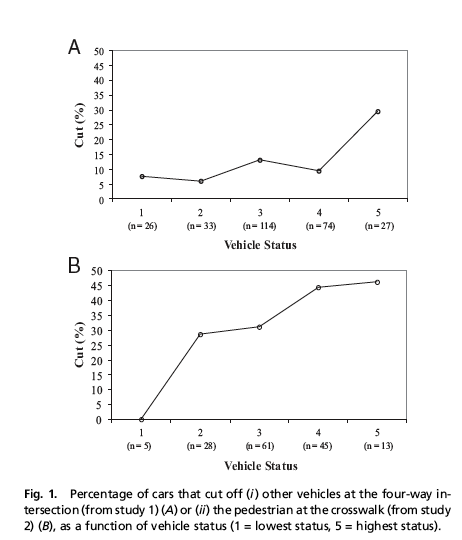You know the stereotype of the arrogant Porsche driver? Well, science says there's some truth to it.
People driving luxury cars are more likely to fail to yield to pedestrians in the crosswalk and to engage in other unethical, antisocial behavior, according to a study published in the Proceedings of the National Academy of Sciences.
A research team including Berkeley psychologists Paul Piff and Dacher Keltner have been examining the way social status and wealth affects morality. Their findings -- which are getting a lot of media attention -- broadly show that wealthier, higher-status individuals are, essentially, more likely to cheat.
Piff and Keltner, working with researchers from the University of Toronto, conducted seven experiments. Two of them measured the behavior of drivers at four-way intersections and at crosswalks.
The team used vehicle make, model, and year as shorthand for the driver's social status. In both cases, when controlling for the sex of the driver, time of day, and other factors, the research team found that higher-status drivers were more likely to cut off other drivers at the intersection or fail to yield to pedestrians in a crosswalk.
In the first experiment, about 12.5 percent of drivers proceeded through an intersection without yield to other drivers with the right of way. The drivers of expensive cars were much more likely to engage in this illegal behavior -- 30 percent of the drivers classified in the most "high-status" category cut off other drivers. In the second experiment, 35 percent of all drivers failed to yield to pedestrians, compared to 46 percent of those driving the fanciest cars.
The research team wrote that the findings are, of course, not to imply that morality is an absolute function of social class, but that "unethical behavior in the service of self-interest that enhances the individual’s wealth and rank may be a self-perpetuating dynamic that further exacerbates economic disparities in society."
By way of explanation, the authors wrote: "Upper-class individuals’ relative independence from others and increased privacy in their professions may provide fewer structural constraints and decreased perceptions of risk associated with committing unethical acts."
In terms of traffic enforcement, the findings provide more justification for graduated fines, which vary according to the motorists' income. In European countries, where traffic fatality rates tend to be much lower than in the U.S., it is common to assess higher traffic fines on higher-income law-breakers.






